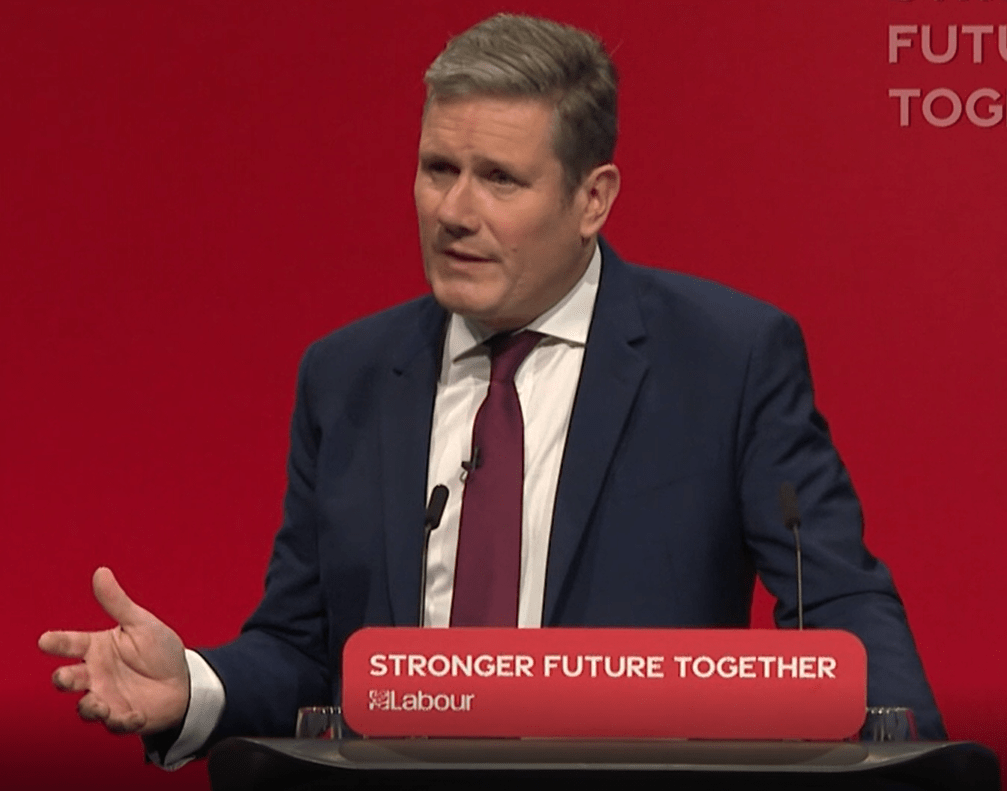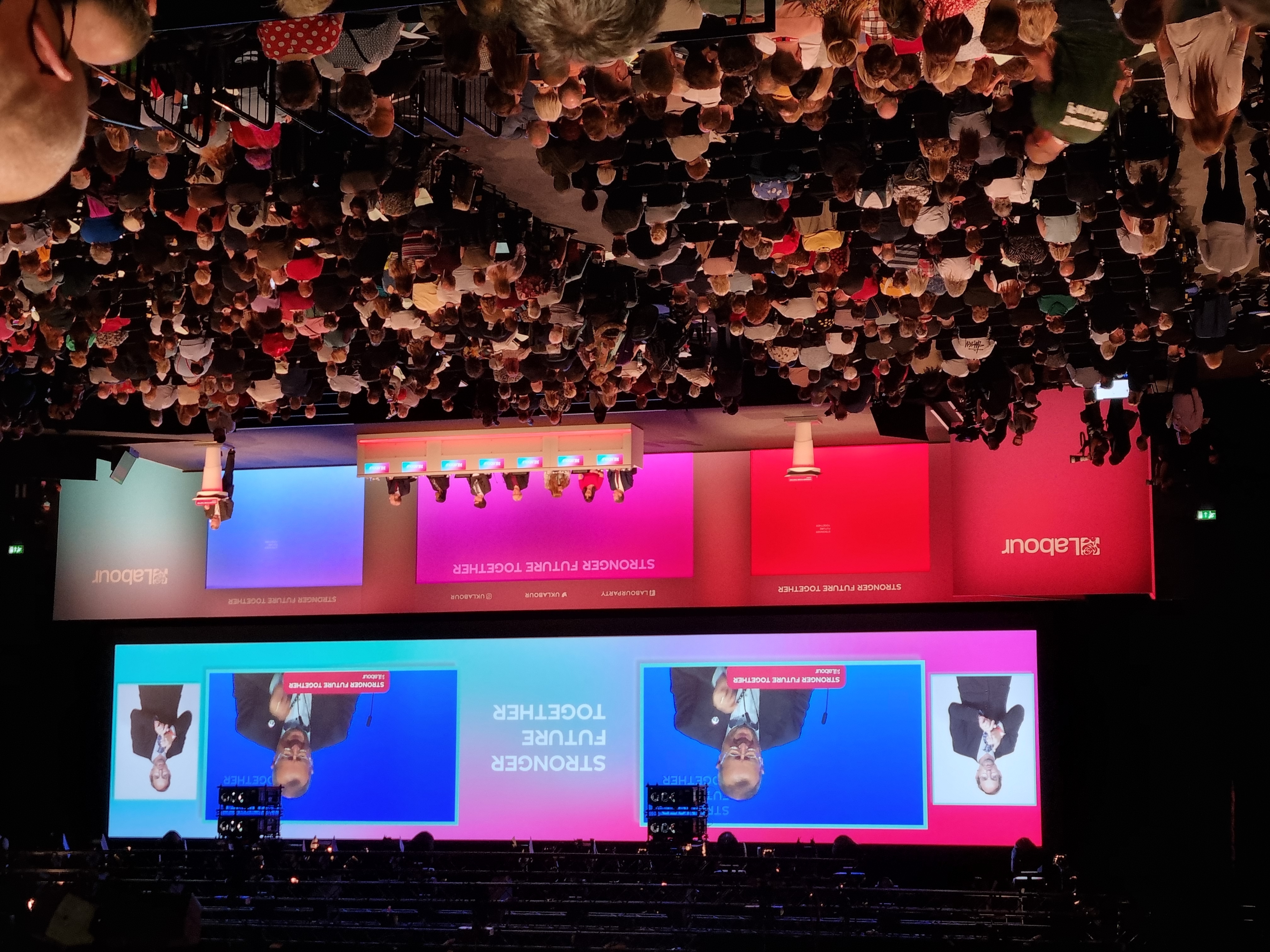The Labour Party conference confirmed the strengthened position of the right wing at the top of the Labour Party, as it was expected to do. But their success did little to dampen the political aspirations of the Labour and trade union rank and file, which is still firmly on the left.
There are therefore two stories to tell about the conference. The first, that the right wing and the Parliamentary Labour Party have strengthened their position in political and organisational terms by means of rule changes, is the one that has mainly been featured in the press.
A purge of lefts has been going on for a time now and some delegates even turned up in Brighton with credentials, only to be denied entry. The new disciplinary process, allegedly ‘independent’ but, making general secretary David Evans judge, jury and executioner, will be used even more against the left in the coming months.
Right wing MP Wes Streeting, talking to the BBC after the conference, made a remark along the lines that “the barnacles need to be scraped off the boat.” This disgraceful comment is an insult to all those Labour activists from outside his constituency, who worked for him in his election a few years ago, when his seat was a marginal.
Right wing MPs want a meal ticket for life
Most Labour MPs believe that once having been selected to fight a seat, they should be candidates for life, that they should have a meal-ticket in perpetuity. The new constitutional changes have indeed made it more difficult, although not impossible, for Constituency Labour Parties to select a candidate of their own choosing. They also increase the power of Labour MPs to veto leadership candidates of the left, for fear that the more radical membership might vote them in.
The press have also focused on the speeches by Rachel Reeves and Keir Starmer, firmly planting the Party leadership to a Tory-lite position on economic and political questions. “We will not give commitments,” they both said, “that we cannot pay for.” All of the shadow cabinet speakers at conference studiously ignored the content of the conference motions which they were supposed to be addressing. Their only means of getting applause seemed to be an obligatory reference to the sacrifices of key workers.

The other story that needs to be telling is about the political character of the delegations, as it was reflected in the resolutions that they passed. We have published in their entirety some of those resolutions, not because they were perfect – resolutions seldom are – but because they reflect in a very authentic way the aspirations of workers.
In tone and content, they were little different to similar resolutions in previous conferences during the Corbyn leadership. While the current leadership have clung tenaciously to a £10 an hour National Minimum Wage, for example, conference virtually unanimously acclaimed the demand for a minimum of £15.
The best articulated voice of the working class there is
While the leadership tried to minimise the impact of support for Palestinian rights, by banning flag-waving (so prominent in the conference hall three years ago), they could not stop conference overwhelming passing a resolution branding Israel as an ‘apartheid’ state, in terms more explicitly radical than past resolutions.
Although the conference was more stage-managed than in previous years, with more shadow ministers speaking from the platform, it was impossible to drown out the voice of working-class people speaking from the rostrum. As in previous years, it was the rostrum that represented the best-articulated voice there is of working class hopes and aspirations.
Speaker after speaker addressed the day-to-day problems of workers: low pay, poor or unaffordable housing, poverty, problems in Education, the NHS, social care and on many other issues. They also articulated the aspirations of workers for policies to address those issues, so the demands put forward were much more in keeping with the Labour manifestos of 2017 and 2019 than the Tory-lite approach of the leadership.
Despite the victories of the right on organisational/constitutional issues, therefore, every single political debate and resolution underlined a genuine urge for radical change.
A socialist programme would be necessary
It is true that the radical demands contained in those resolutions lacked the coherence of the socialist programme that would be necessary to carry those demand into reality. The reforms listed in so many of the resolutions would prove to be impossible on a capitalist basis and could only be guaranteed by the democratic ownership of the main levers of the economy and the banks, and the development of a plan of production. That is an argument that still needs to be pressed, even within the left of the party.
Capitalism in general and the weak and feeble British capitalism especially, is not able to offer anything to working class people besides more sacrifices, more blood, toil, tears and sweat. In the event of Labour coming into office, the minimal pledges offered by Keir Starmer and Rachel Reeves, will be overshadowed by the fact that they base their entire strategy on a more ‘humane’ and ‘effective’ management of the capitalist system. It is a strategy doomed to disaster.
Any incoming Labour government, of the right or the left, would face the enormous pressure of the banks, the financial speculators, the Bank of England, the collective voice of the billionaire press and the media to ‘tone’ down any reforms and maintain a strict control over state finances. With a Labour leadership starting off with a determination to keep a ‘tight rein’ on policy there is little chance of the aspirations written into the resolutions being met.
That is a debate that we will come back to repeatedly in the Party and in the trade unions, but the fact remains that the tone of the rostrum contributions and the general tenor of the resolutions passed were far to the left of the leadership and indistinguishable from similar resolutions passed in recent years.
Starmer did not get everything his own way
The victories of the right wing in this conference, therefore, have to be seen in perspective. First of all, Starmer did not get it all his own way, even on constitutional changes. The trade unions coordinating group, TULO, rejected his attempt to slash the franchise of party members in electing the leader and giving greater weight to the votes of MPs.
But more importantly, the wind of change – it is more like a gale – is blowing to the left. Faced with a squeeze on living standards and no prospect of the insecurities of everyday life being ameliorated, millions of workers will be demanding real change in the coming months and years, not just words and promises. A significant part of that social and political pressure will be transmitted through the trade unions and, through them, into the Labour Party.

It was notable at the conference that even the delegations of right-wing unions like the GMB and USDAW, voted in support of the £15 an hour minimum wage. That is not because those union bosses have had a Damascene conversion, but because their members are pushing them for it.
Indeed, the right-wing trade union leaders are playing a double game, playing both ends against the middle, as it were. It is true that the decisive struggle for a living wage will be based on the workplace and to what extent union leaders put their money where their mouths are. The more militant and determined the actions of the unions, the more success they will have.
Right-wing trade union leaders do not take their own campaign seriously
But it still would have been an enormous moral boost, for the leading opposition party to publicly support the demand for £15 and it was something Starmer pointedly refused to do. When trade union leaders bend over backwards to prop up such a leader, even acceding to some of his organisational changes, knowing that he does not support £15, then whatever they say they cannot be serious about £15 themselves. It is only a matter of time before these same leaders are appealing to their members to be ‘patient’ and to “wait for a Labour government” for their needs to be met.
The right-wing trade unions are shifting at the moment, therefore, not because of the leaders, but despite those leaders. There are, of course, other trade union leaders on the left who may well pursue their members’ interests irrespective of what the shadow cabinet want, and we wish more power to their elbow.
Workers in general and the membership of the trade unions, will be insistent, loud and demanding, in pursuit of their rights. They are – unlike right-wing Labour MPs, who might as well live on another planet – rooted in the real conditions of everyday life. Their demands for change will become greater as the months and years go by.
What then, is our task in the meantime? It is to build support in the trade unions and Labour Party for genuine socialist ideas, to give voice to workers’ demands and point to policies and a programme that can deliver them. Given the swing of the tops of the Labour Party to the right, the only justification there is for staying in the Labour Party is to help organise the left to fight back.
Within that left, it will be the Marxists, including Left Horizons, who will provide the most unbending, determined and clearest voice. The left as a whole has lacked a backbone of steel, and some would say it has lacked any kind of backbone at all. We will help provide it and we will continue the fight in the Labour Party for as long as we are able.



